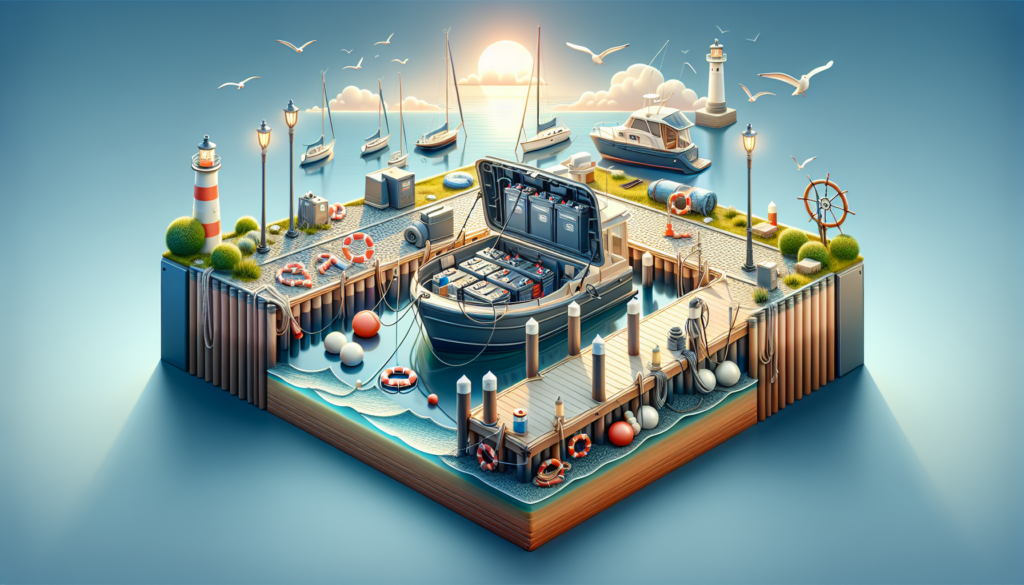Exploring the Depths of Marine Batteries: Powering the Seas
Marine batteries play an essential role in providing power to various vessels, from small boats to massive ships. These batteries are specifically designed to withstand the harsh marine environment, ensuring reliable performance when out at sea. In this comprehensive guide, we will delve into the world of marine batteries, exploring their types, applications, and importance in the maritime industry.
The Evolution of Marine Batteries
Marine batteries have come a long way since their inception. The early days of marine propulsion relied on simple lead-acid batteries, which provided limited power and had a short lifespan. However, advancements in battery technology have led to the development of more efficient and durable options for marine applications.
One of the most significant advancements in marine batteries is the introduction of lithium-ion batteries. These batteries offer higher energy density, longer cycle life, and faster charging capabilities compared to traditional lead-acid batteries. As a result, lithium-ion batteries have become the preferred choice for many marine vessels, ranging from recreational boats to commercial ships.
Types of Marine Batteries
There are several types of marine batteries available on the market, each with its unique characteristics and applications. The most common types of marine batteries include:
1. Lead-Acid Batteries
Lead-acid batteries are the traditional choice for marine applications due to their cost-effectiveness and reliability. These batteries are available in two main variants: flooded lead-acid batteries and sealed lead-acid batteries. Flooded lead-acid batteries require regular maintenance to ensure optimal performance, while sealed lead-acid batteries are maintenance-free but may have a shorter lifespan.

2. AGM Batteries
AGM (Absorbent Glass Mat) batteries are a type of sealed lead-acid battery that uses a fiberglass mat to absorb electrolyte. These batteries are maintenance-free, spill-proof, and can withstand deep discharges, making them ideal for marine applications where reliability is crucial.

3. Gel Batteries
Gel batteries use a gelified electrolyte to provide power. These batteries are designed to be maintenance-free, vibration-resistant, and have a longer cycle life compared to traditional lead-acid batteries. Gel batteries are suitable for marine applications where durability and longevity are essential.

Applications of Marine Batteries
Marine batteries are used in a wide range of applications, from powering navigation systems and communication devices to providing electrical power for onboard appliances and equipment. Some common applications of marine batteries include:
1. Starting Batteries
Starting batteries are designed to provide a high burst of power to start the engine of a marine vessel. These batteries deliver a short, high-amperage burst of energy to crank the engine, ensuring reliable starting even in cold weather conditions.
2. Deep Cycle Batteries
Deep cycle batteries are designed to provide a steady and continuous power supply over an extended period. These batteries are ideal for powering onboard electronics, lighting, and appliances on a marine vessel. Deep cycle batteries can withstand repeated discharges and recharges without compromising performance.
3. Dual-Purpose Batteries
Dual-purpose batteries combine the characteristics of starting batteries and deep cycle batteries, making them versatile for various marine applications. These batteries are designed to provide both high cranking power and long-lasting performance, making them a popular choice for small to mid-sized boats.
The Importance of Marine Batteries
Marine batteries are crucial for the smooth operation of marine vessels, providing power for propulsion, navigation, communication, and comfort systems. Without reliable marine batteries, vessels would be unable to function effectively, risking safety and operational efficiency at sea.
Proper maintenance and care of marine batteries are essential to ensure their longevity and performance. Regular inspections, charging, and cleaning of marine batteries are necessary to prevent premature failure and ensure reliable power supply onboard a vessel.
Expert Opinions
We spoke to marine industry experts to get their insights on the importance of marine batteries. Captain John Smith, a seasoned sailor with over 20 years of experience, emphasized the critical role of marine batteries in modern maritime operations.
“Marine batteries are the heart of any vessel. Without reliable power supply, sailors would be left stranded at sea, unable to navigate, communicate, or operate essential equipment. Investing in high-quality marine batteries is a wise decision for any boat owner,” said Captain Smith.
Common Misconceptions
There are several misconceptions surrounding marine batteries, with one of the most common being that all marine batteries are the same. In reality, there are various types of marine batteries, each designed for specific applications and operating conditions.
Another common misconception is that marine batteries do not require maintenance. While some sealed lead-acid batteries are marketed as maintenance-free, all marine batteries benefit from regular inspections, cleaning, and charging to ensure optimal performance and longevity.
Comparative Analysis
When comparing different types of marine batteries, several factors should be considered, including cost, lifespan, maintenance requirements, and performance. Lead-acid batteries are typically the most cost-effective option but may have a shorter lifespan and require regular maintenance. On the other hand, lithium-ion batteries offer superior performance and longevity but come at a higher cost.
Ultimately, the choice of marine battery depends on the specific requirements of the vessel and the budget of the boat owner. Consulting with a marine battery expert can help in selecting the right battery for a particular application.
Conclusion
To wrap things up, marine batteries are an essential component of any marine vessel, providing power for propulsion, navigation, communication, and onboard systems. With advancements in battery technology, marine batteries have become more efficient, reliable, and durable, ensuring the smooth operation of vessels at sea.
Investing in high-quality marine batteries and ensuring proper maintenance is crucial for the safety and efficiency of marine operations. By understanding the different types of marine batteries, their applications, and the importance of proper care, boat owners can make informed decisions to power their vessels effectively.
Long story short, marine batteries are the lifeline of the seas, powering vessels of all sizes and ensuring safe and reliable navigation on the water. Whether sailing for leisure or conducting commercial operations, having the right marine battery onboard is essential for a successful and enjoyable maritime experience.



